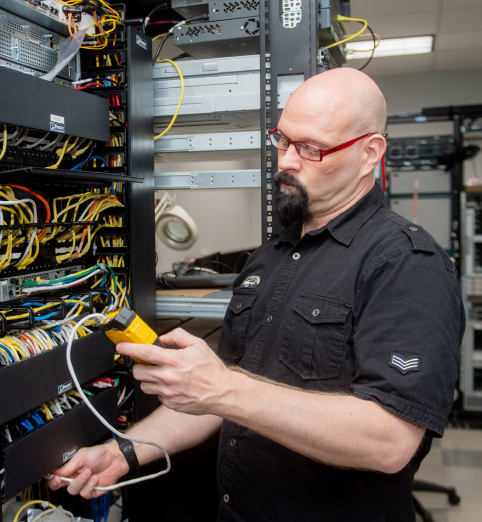Global vs. Local ITAD Vendor Comparison: Which to Choose?
When comparing local vs. global ITAD vendors, secure data destruction, detailed reporting, and “end-to-end service” are promises you’ll hear from both.
But a local provider can be ideal for one site but the wrong choice for another. And a global vendor can simplify processes across regions, but sometimes at a cost that outweighs the value of the assets.
The key is to match the vendor’s scope with the size, value, and complexity of your IT asset disposition needs.
This guide shows you when to choose a local partner, when a global provider is worth it, and how to avoid delays, compliance risks, and unnecessary costs.
Understanding ITAD Vendors
Before comparing ITAD providers, it helps to understand exactly what ITAD vendors do, and how the scope of their services impacts outcomes in security, compliance, and sustainability.
What ITAD Vendors Do
IT Asset Disposition (ITAD) is the process of securely and responsibly retiring IT equipment, including desktops, laptops, servers, storage devices, and networking hardware. Vendors typically offer:
- Certified data destruction (e.g., wiping, degaussing, shredding) to protect sensitive information.
- Refurbishment and resale or remarketing, extending the useful life of equipment and generating value recovery.
- Recycling or responsible disposal for assets that can’t be repurposed, minimizing environmental impact.
- Chain-of-custody tracking and reporting, providing audit trails and documentation needed for compliance and risk management.
Types of ITAD Providers (Local vs. Global)
Choosing between local and global ITAD vendors comes down to how their strengths align with your organizational needs.
Local ITAD Vendors
Best use case: Modest site decommissions, regional offices, or one-off projects.
Local vendors excel at speed and local compliance. If your footprint is compact, for example, one or two offices with modest IT loads, they deliver with low overhead and a more personal approach. They typically provide:
- Hyper-local pickups and same-week scheduling
- Flexible pricing on low-volume jobs
- Potential cost efficiency when authenticity in service matters most
When complexity increases, so does risk:
- Chain of custody and reporting can become fragmented if you rely on multiple local vendors, creating audit and compliance headaches
- They lack certifications for expanded regulatory environments and ESG needs
- Resale and value recovery channels are narrow, so you leave money on the table and may pay for service costs rather than offsetting them
Global ITAD Providers
Best use case: Mid-size to large enterprises with distributed IT assets, multi-site audits, or strict sustainability and compliance requirements.
Global vendors operate on a unified model with tight standards, centralized reporting, and broad certifications such as R2v3, e-Stewards, NAID AAA, and ISO 14001. Key advantages include:
- One SLA, one report, one vendor, which reduces administrative overhead
- Consistent compliance and documentation across all geographies
- A proven, border-agnostic chain of custody backed by audits and logging
- Ability to bundle volume and use resale networks to offset costs
- Stronger alignment with ESG targets and sustainability reporting.
For smaller projects, global vendors can exceed what’s necessary:
- Minimum fees or volume thresholds can outweigh asset recovery value for smaller projects
- Pricing and service models are standardized, leaving less room for flexibility.
Key Factors to Consider When Choosing a Global vs. Local ITAD Provider
Here are the key factors to weigh when deciding between a local or global ITAD provider:
Cost Implications
Local ITAD vendors tend to be more cost-effective for smaller companies. They’re nearby, which means lower travel expenses, quicker pickups, and less overhead.
If your company is disposing of a few dozen laptops or decommissioning a small office server, a local vendor can provide responsive service without inflating the budget.
In contrast, global ITAD providers become cost-effective at scale. While they charge more upfront for coordination, their larger infrastructure allows them to offer economies of scale, especially when repurposing higher-value hardware like servers, networking gear, or enterprise storage.
Global vendors often have remarketing teams and wider resale channels, helping you recover more value from high-end assets.
Here are some hidden costs to consider:
- Logistics gaps (e.g., missed pickups or scheduling delays) with local vendors unfamiliar with enterprise timelines
- Compliance fines for improper disposal or data sanitization
- Missed resale opportunities due to limited local vendor channels
Asset Volume and Value
If you’re managing low-value or commodity assets (like aging desktops or basic networking gear), it’s not worth paying for high-touch global coordination. A local provider can handle the job with fewer layers and a faster response.
But when you’re dealing with enterprise-grade servers, data center racks, or high resale-value equipment, a global vendor’s resale network and audit-grade tracking offer much higher returns.
They can also handle bulk disposals efficiently, something smaller vendors struggle with during large-scale refreshes, consolidations, or Mergers and Acquisitions.
Logistical Considerations
Local providers offer faster turnaround times for single-site businesses. They dispatch trucks quickly and have strong relationships with account managers or ops teams. This is ideal for decommissioning a branch office or refreshing equipment in a small region.
On the other hand, global ITAD vendors bring consistency and centralized control. Enterprises with 10+ locations across the U.S. (or globally) benefit from having:
- A single point of contact
- Standardized pickup processes
- Unified tracking and reporting systems
This reduces communication silos and guarantees that all locations follow the same security and environmental protocols.
Global vs. Local ITAD Vendors: Compliance and Risk Management
Compliance and risk management are just as important as cost and logistics in ITAD. If data isn’t properly wiped or if devices are handled by uncertified vendors, companies risk facing legal penalties, lost customer trust, or environmental violations.
Certifications and Standards
Trusted ITAD providers follow industry certifications that show they’re meeting data security, environmental, and privacy requirements. Some of the most important certifications include:
Global ITAD providers like Inteleca carry all of these certifications, making them better suited for companies that need to meet strict industry or international standards, like those in healthcare, finance, or government.
Local vendors offer more flexibility but sometimes lack full certification coverage. While they can still follow secure practices, they may not meet every compliance need, especially if your company operates across multiple states or countries.
Chain of Custody and Reporting
Chain of custody means having a documented path that tracks every asset from pickup to final disposal. This guarantees no device or sensitive data gets lost, mishandled, or left unaccounted for.
Global ITAD providers usually have standardized tools for this. They offer consistent documentation, asset tracking, and reporting dashboards across all locations. This is especially important for large organizations with internal audit teams or regulatory oversight.
On the other hand, local vendors provide simpler or more customized reporting for small businesses. While this can be helpful for one-off projects or regional work, it does not offer the level of detail or consistency needed by enterprises with ongoing compliance requirements.
Scenarios for Local vs. Global Providers
Choosing the right ITAD vendor depends heavily on your company’s size, location footprint, and compliance needs. Below are two clear scenarios that show when a local or global provider makes the most sense.
When a Local ITAD Vendor Makes Sense
A local ITAD vendor is the best fit for companies that are smaller, operate in fewer locations, and have lower hardware disposal needs. These vendors typically offer faster service, simpler logistics, and lower costs.
Best-fit situations:
- Small or mid-size businesses with a limited number of devices
- Single-site or regional operations where equipment is decommissioned in one area
- Projects with basic compliance requirements, such as desktop refreshes or office closures
- Where fast turnaround matters more than scale or resale value
Example: A 20-person company upgrading laptops in one regional office can use a local vendor to handle pickup and mitigate data security risks.
When a Global ITAD Vendor Is the Better Choice
A global ITAD provider is better suited for large, multi-site companies with more complex IT environments and stricter compliance needs. When managing IT assets for enterprises, these providers offer consistent processes, detailed documentation, and broader resale networks.
Best-fit situations:
- Enterprises with multiple offices, warehouses, or data centers
- Companies in regulated industries, such as finance, healthcare, or government
- Organizations with ongoing IT refresh cycles across different states or countries
- Projects requiring serialized tracking, audit logs, and unified compliance reporting
- Companies managing high-value assets like NVIDIA servers for HPC
Example: A multinational bank upgrading servers across six branches needs standardized data destruction, GPS-tracked pickups, and consistent chain-of-custody reports, something a global vendor can deliver at scale.
Global vs Local ITAD Vendors: Pros and Cons
Below is a side-by-side look at what each type of ITAD provider offers:
Local ITAD Vendors
| Pros | Cons |
| Lower cost for small, local jobs | Inconsistent service quality, standards vary across regions/vendors |
| Personalized, high-touch service | Limited geographic reach & scalability |
| Quick on-site response & flexibility | Fewer staff, limited equipment variety, and less backup capacity. |
| Deeper local business relationships | May lack formal compliance credentials |
| Better adaptability to urgent or custom needs | Lower resale or remarketing capacity |
Global ITAD Providers
| Pros | Cons |
| Provides one contract, one SLA, and consolidated invoicing or reporting for easier management | Higher upfront cost, especially for small-scale or regional-only projects |
| Handles ITAD across multiple sites or countries with consistent standards | Requires more time for onboarding and aligning internal teams |
| Offers centralized tracking, audit-ready documentation, and uniform chain of custody | Less responsive to one-off requests |
| Holds multiple certifications to meet strict compliance needs | May offer less personalized service compared to smaller local vendors |
| Has stronger resale and remarketing networks for high-value assets |
Making the Right Choice for Your Organization
Depending on your asset load and footprint, local or global might suit you better, or a hybrid approach. Here’s how to tell:
Decision Framework
Use the following steps to assess your needs and match them to the right ITAD approach:
Map Your IT Asset Landscape
Create an inventory of IT assets by type, volume, and location. This step is foundational for effective IT asset management, helping you understand the lifecycle, value, and disposition requirements of your hardware.
Consider how often your organization decommissions equipment and whether those assets have resale potential.
Example: If you’re disposing of high-value servers across multiple sites, you’re likely to benefit from global coordination.
Assess Compliance and Risk Requirements
Determine if your industry is subject to strict regulatory requirements (e.g., HIPAA, GDPR, CCPA).
- Enterprise-level compliance typically requires certified providers with standardized processes.
- For basic wipe-and-recycle jobs, a local provider may still meet your needs.
Compare Cost vs. Value
Look beyond just service pricing. Weigh logistics costs, potential resale value, internal resource savings, and the risks of non-compliance.
- Local vendors can be cheaper upfront, but might limit value recovery.
- Global vendors recover more value from high-end assets and reduce audit prep time.
Evaluate Reporting and Internal Oversight Needs
If your business requires audit trails, centralized documentation, or multi-location coordination, global providers will offer better systems for visibility and control. Smaller companies without dedicated IT governance teams prefer a vendor who handles the paperwork for them.
Hybrid Approach
Many organizations benefit from using both local and global ITAD providers, based on project size, urgency, or region.
Here’s when hybrid makes sense:
- Regional office refreshes can be handled quickly and cost-effectively by local vendors.
- Large-scale data center decommissions or corporate-wide refreshes are better suited for global providers with broad infrastructure.
- Global firms with regional autonomy allow local teams to choose providers for day-to-day disposals while maintaining a master contract with a global ITAD partner for major projects.
Inteleca offers flexible ITAD services built for both one-off projects and global asset programs. From secure data wiping to certified recycling and resale, we handle the details, so you can focus on what’s next.
Learn more about Inteleca’s IT asset disposition services today by scheduling a free consultation with our experts.



